- Empty cart.
- Continue Shopping

In order to identify what features you need in your next e-commerce platform, you should evaluate Shopify’s competitors.
We’ve compiled a list of some of the most popular e-commerce platforms currently available.
1. Narrow Store
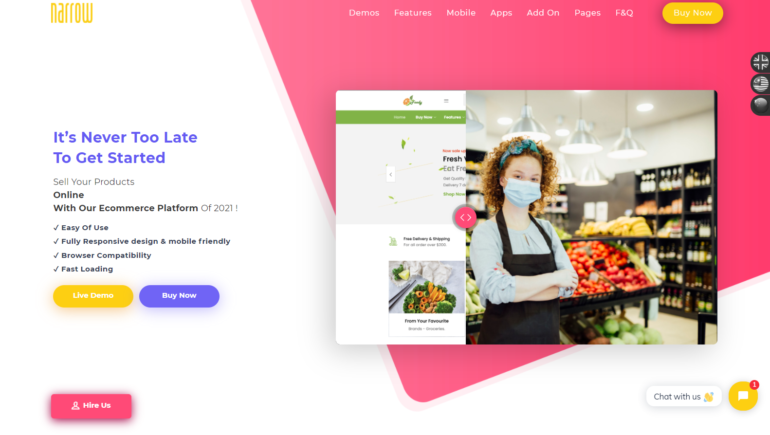
Narrow Store is an open-source technology for e-commerce platforms. Narrow Store can be acquired by WordPress, if you are already familiar with WordPress is good for you. Plus, the Narrow Store is good for someone who just wants to start an online business.
Is a good Shopify alternative if want to score for a high rank in search engine because it has better control on SEO capabilities.
Pro
- You can get unlimited use of users, products, and categories.
- Offers a full e-commerce platform at a good price.
- Free and paid plugins and extensions are both available.
Cons
- The domain hosting, an SSL certificate, email provider, and other features are not included in any plan.
- Narrow Store offers only 25 themes, compared to Shopify’s vast collection of themes.
2. Big Commerce
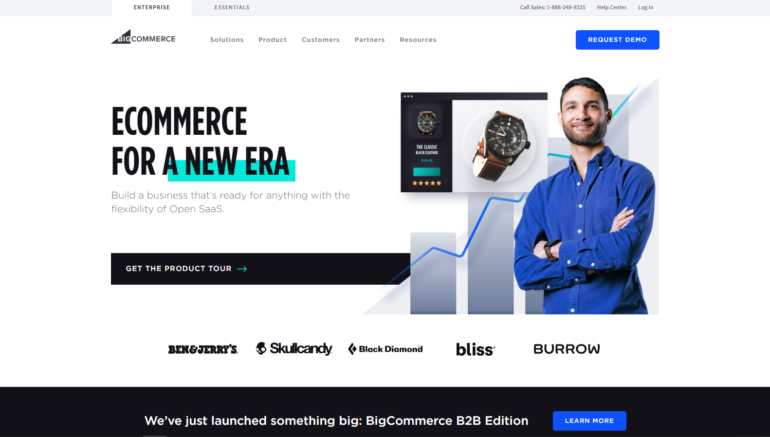
BigCommerce is a flexible, open SaaS e-commerce platform that allows companies of all sizes to build and scale their online stores.
Although Shopify is great for getting started, BigCommerce is a better option if you plan to expand and scale your business.
Pros
- Robust out-of-the-box features are included with every plan.
- Support for over 55 payment gateways with no additional transactions fees.
- Page Builder, the drag-and-drop visual editor, doesn’t require any coding knowledge.
- Omni-channel selling abilities, including an in-app checkout for social media platform Instagram.
- Extensive SEO capabilities, such as fully customizable URLs.
- Support is available 24/7 with over 85% of issues resolved on the first phone call.
Cons
- While BigCommerce has a wide range of paid themes, there are only five free themes compared to Shopify’s nine.
- Compared to Shopify, there’s a slight learning curve because you get so many more out-of-box features.
3. WooCommerce
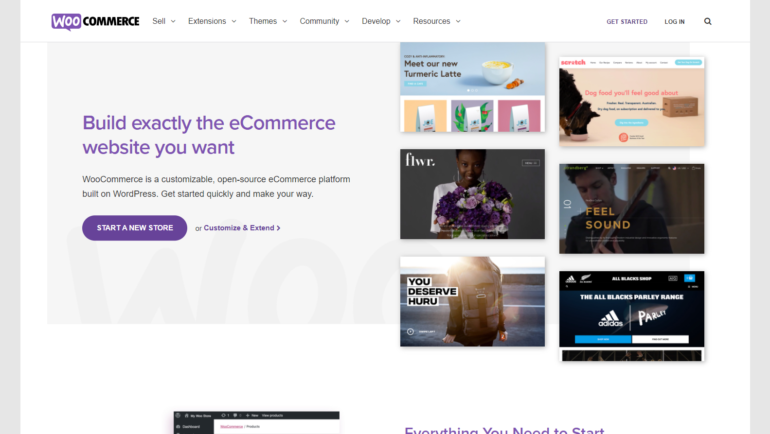
It is a free open-source plugin designed to enable WordPress websites and blogs to function as e-commerce sites. If you’re already familiar with WordPress, then you may consider WooCommerce instead of Shopify.
However, if you’re worried about being limited to using WooCommerce with your WordPress blog, then, don’t worry.
Pros
- The plugin itself is completely free to use with any WordPress site.
- It’s easy to integrate with any existing WordPress site.
- Because it’s open-source, you can fully customize your store’s code.
- You have access to hundreds of free and paid extensions.
Cons
- Even though the plugin is free, you’re still responsible for the costs of domain hosting, an SSL certificate, finding an email provider, and other features.
- To make the most of your e-commerce store, you’ll probably need the help of a dedicated developer or designer if you don’t know HTML and CSS.
- Adding core features to WooCommerce requires a plug-in – leading to more complexity and lower site performance.
4. Magento
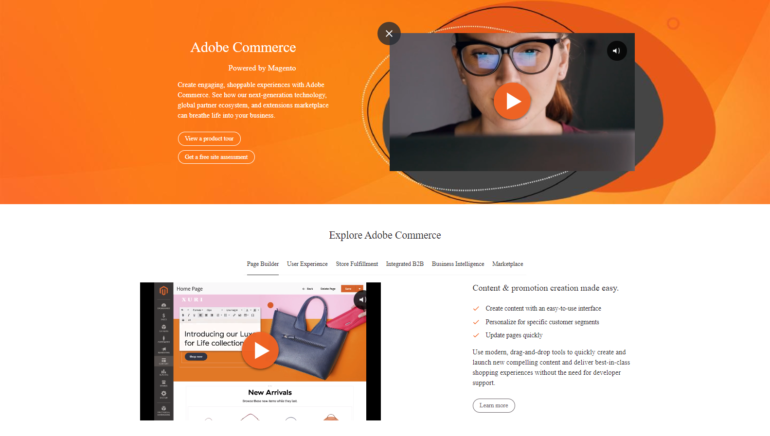
Magento is an e-commerce platform built on open source technology. Magento was acquired by Adobe in 2018 and now offers Magento Commerce for enterprise businesses as well as Magento Open Source for small businesses.
Magento may be a better choice for those who also have extensive developer skills and prefer Adobe’s other products.
Pros
- Because it’s open-source, you have access to the backend to customize everything in your store.
- Magento has a large network of over 260,000 developers worldwide creating additional functionality for the platform.
- Enterprise businesses on Magento Commerce have the option of a cloud-hosted solution as part of the package hosted on AWS or a self-hosted solution.
- You get access to a large partner ecosystem for third-party apps and add-ons.
Cons
- Magento Open Source is strictly on-premise, so you either need to host it yourself or go through a third-party web hosting provider.
- While Magento provides patches and upgrades, you are responsible for installing and managing these updates.
- No matter which version you choose or how you host your website, you’ll need a developer, in-house IT team, and/or an agency to manage the build and maintenance.
- Magento has an extremely extensive setup, which leads to high costs to complete the builds.
5. PinnacleCart
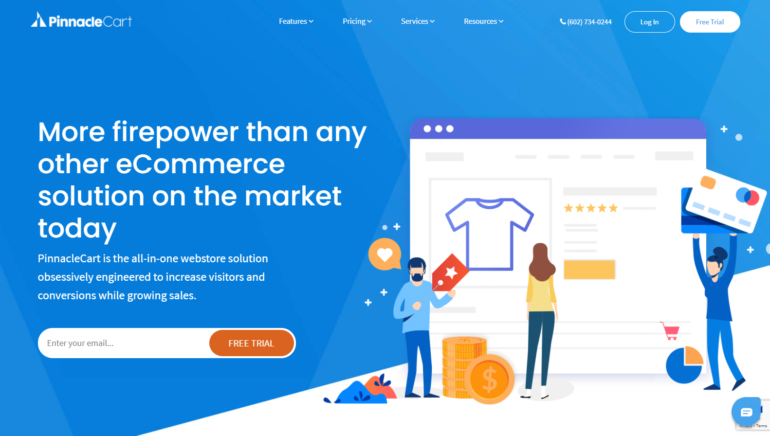
PinnacleCart provides e-commerce solutions for small-to-medium-sized businesses with a strong marketing focus.
As a Shopify alternative, it can be an excellent choice for those who want greater control over their storefronts as well as better SEO capabilities.
Pros
- PinnacleCart offers hosting services or you can choose to manage your own hosting.
- Implement SEO-friendly features like schema.org tags and custom URLs.
- All plans include unlimited categories and products.
Cons
- If you choose PinnacleCart, you are going to be charged an extra fee for extra traffic or will need to upgrade your plan to include unlimited bandwidth.
- Because PinnacleCart has versions, you’ll need to manage upgrades.
- A limited number of apps are supported, as it only integrates with 64 apps.
- While Shopify has a wide selection of themes, PinnacleCart has only 12 themes.
6. Shift4Shop
Shift4Shop has been offering e-commerce software with a focus on SEO since 1997.
So if you are an SEO junkie and it is important to you that your site ranks well on organic search, Shift4Shop is for you.

Pros
- A variety of SEO tools, such as Google AMP for products and 301 redirects.
- Built-in blogging platform included with every plan.
- You can get a full e-commerce platform for less than the Basic plan on Shopify for very small stores.
- Over 100 online payment solutions, including international processors.
Cons
- A limited number of staff users, costing an additional $10 a month per user.
- There’s a steep learning curve, making it sometimes difficult to navigate the store builder and find the tools you need.
- The free themes all have a very similar design that’s is not as modern as the themes offered by Shopify and BigCommerce.
7. Wix

Wix was founded in 2006 and offers business plans that are ideal for e-commerce companies.
Wix is a better option than Spotify if you have little experience with web design and want a simple website creator.
Pros
- Your store can be up and running quickly with a drag-and-drop website builder.
- Six options per product are supported as well as 300 variant SKUs in total.
- Wix has a robust, well-organized Help Center that’s easy to search.
- They offer a free one-year domain with each of their e-commerce premium plans.
Cons
- Unless you’re on an enterprise plan with custom storage space, you’re limited to a maximum of 50GB.
- Wix doesn’t offer Apple Pay or Amazon Payments as payment providers.
- There’s currently no support via chat, so you’ll need to call or submit a ticket.
- There are so many different options in Wix’s app store that aren’t e-commerce specific that it can be challenging to navigate.
Conclusion
While Shopify might be right for some people, it doesn’t work for everyone. And that’s perfectly fine. There are a lot of e-commerce platforms out there that will help you build and grow your online business.
Make sure you consider the e-commerce features that will have the biggest impact, whether that’s offering multiple payment processors, limiting transaction fees, real-time inventory management, setting up drop shipping, or a user-friendly interface. And then, take some time to evaluate and test each platform. For instance, with Narrow Store, you can get 10% off if you sign up with our newsletter.
At the end of the day, we know we’re a great option for most businesses, but the most important thing to remember is that you have to choose what’s right for you.



